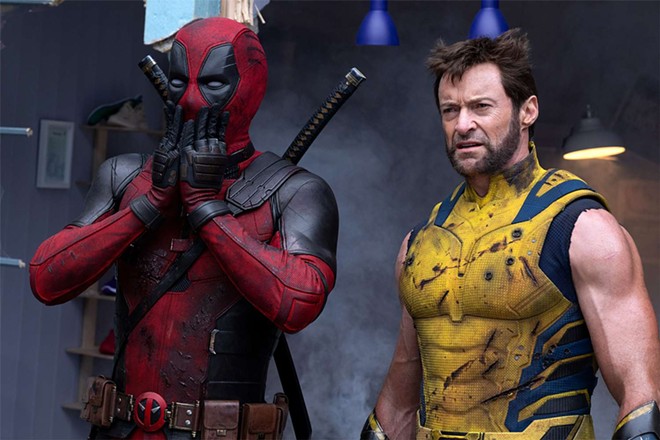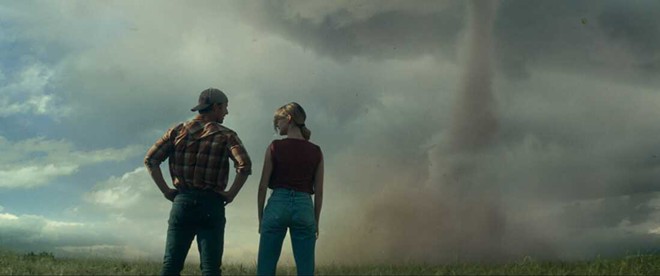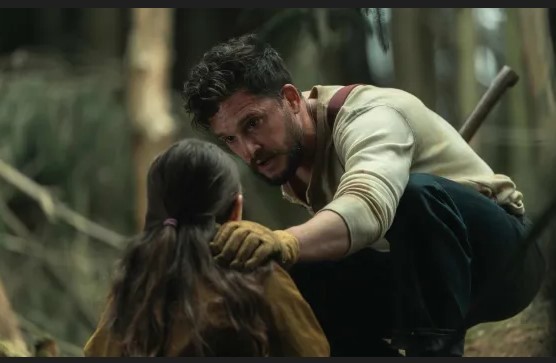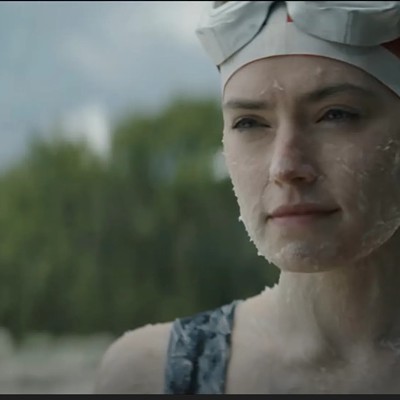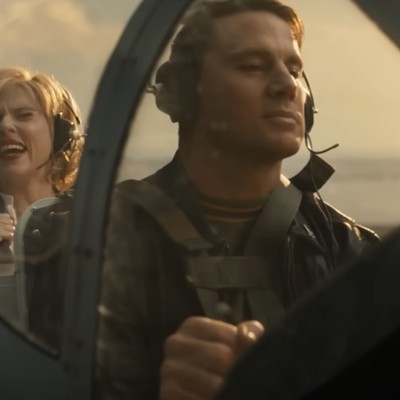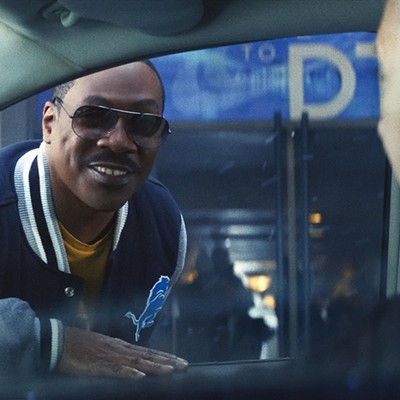Deadpool & Wolverine: More and more and more of the same thing
There’s certainly no way to quantify this, but I’d be willing to bet there hasn’t been a more meta movie made than Shawn Levy’s Deadpool & Wolverine. However, I’m quite sure there’s never been a film made distinctly in the name of fan service than this sure box office winner, a work that bends over backwards to please its ardent followers. Yet, in doing so, it keeps those with a marginal interest in these superhero doings at arm’s distance, likely going so far as alienating some, what with its repetitious, abrasive nature.
But first, some background, which is much needed for the casual viewer, as references abound not only to the various characters and situations from the previous Deadpool movies, but to offscreen machinations that have opened up – for good or ill – a myriad of narrative opportunities and complications. When Disney bought 20th Century-Fox, it acquired the rights to Marvel characters that studio controlled. Thus, the X-Men, Fantastic Four and Deadpool could be folded into the Mouse House’s previous purchased Marvel Cinematic Universe.
There have been small nods to this happening in recent Marvel productions, and Ryan Reynolds, the shepherd of all things Deadpool, has insisted his big screen alter ego is the key to bridging the gap. Only after convincing Hugh Jackman to reprise is signature role of Wolverine, the most famous of the X-Men, was he given the greenlight to do so.
The result is a soft opening, a film that uses the notion of character team-ups from the previously separate universes sparingly. That being said, the choice of characters plucked from the long history of Marvel movies is inspired and play a key role in not only opening the door for more expansive stories in the future, but also giving the 20th Century-Fox iterations a proper send off.
The plot is pretty standard stuff where movies such as this are concerned. The universe, and many others are threatened with destruction and it’s up to the titular duo to stop it. The big bad guy is Paradox (Matthew MacFayden), a middle manager for the Time Variance Authority who’s looking to move up the corporate ladder with a radical policy of immediately ending timelines once that universe loses what’s referred to as it’s “anchor character.” Seems this is the most important person in that timeline and once they die, it’s just a matter before their entire realm dies.
Paradox wants to speed this process up, but Deadpool has serious objections to this when he finds out his universe will die in 72 hours. Taking matters in his own hands, he travels across various timelines to find a Wolverine who can come back and help his world live another day.
A word of caution to fans – this dynamic duo doesn’t cross paths with any of Marvels’ big guns. Iron Man, Captain America, Spider-Man and their ilk are nowhere to be found. However, the characters they do encounter when cast into a realm known as the “trash heap” are cleverly used, as is the villain they encounter there, Cassandra Nova (Emma Corrin), about whom the less said, the better.
Again, it’s an interesting premise and when all the pieces fall into place, it works as well as any of the recent Marvel films. Yet, ultimately, Reynolds can’t get out of his own way to let it be about more than his own character. Those who are fans of the Merc with the Mouth will be thrilled with the character’s constant snarkiness as well as the numerous fourth-wall asides. Deadpool’s quips are fast, furious and tiresome. The complaint I’ve always had with the character is that a little of him goes a long, long way, and in a film that clocks in at over two hours, there’s far too much of him.
Also off-putting is the casual nature of the graphic violence on display. I understand ripping the spines out of characters, stabbing them repeatedly in the face or stomping them into a pulp is de rigueur for the character. Yet, the constant carnage soon wears out its welcome, beating the audience into submission and leaving a bad taste.
What’s ironic is that Levy and his four co-writers repeatedly cite the problems plaguing superhero movies, yet fail to avoid them. References are made to them being overlong, repetitious in plotting and containing little in the way of surprises. True to form Deadpool & Wolverine overstays its welcome, utilizes a dog-eared plot and, in the end, gives the fans what they want. Of course, that’s the whole point, and they will likely bound out of the theater pleased. The rest will ponder just where the superhero genre went wrong, reminisce about the days when filmmakers took risks and appreciate once more the magic of the 90-minute movie. In theaters.
Twisters: As careful as it can be
Intent on being the one disaster movie for all viewers, Lee Isaac Chung’s Twisters attempts to provide thrills aplenty without alienating any of its viewers. For the most part it succeeds, following the template of the 1996 disaster classic to a T. And while it might be lacking in originality, it succeeds in delivering thrills aplenty, exploiting every aspect of the cinematic experience, delivering a film that’s necessary viewing in the theater.
Echoing the opening of the Bill Paxton-Helen Hunt feature, things start with a tragedy. As a series of tornadoes rip through the Oklahoma panhandle, Kate (Daisy Edgar-Jones) and her research team are chasing down a twister in an effort to execute an experimental procedure she hopes will dissipate the tornado. Unfortunately, it’s a plan that looks good on paper but doesn’t play out well in reality. The death of two her cohorts put her in a tailspin that causes her to walk away from her research.
However, five years later, she reluctantly reenters the field when a former colleague, Javi (Anthony Ramos), approaches her with a deal she cannot refuse. Backed by a mystery investor with deep pockets, she’ll be able to continue her research, provided she use her preternatural twister-detecting abilities to help a group of arrogant meteorologists with their work. They turn out to be almost pleasant compared to Tyler (Glen Powell), a YouTube sensation who satisfies his adrenaline addiction by driving into danger, livestreaming as he goes.
The requisite action scenes are as thrilling as modern computer-generated effects can make them. Yet, it all leaves a bad taste, the increasingly frequent real-world disasters never far from the viewers’ minds. A few nods are given to victims of the storms and their respective communities, but these moments come off as a reluctantly executed commitment rather than a serious consideration of the disasters being used as narrative fodder. It’s obvious more consideration should be given to victims and their plight, but that’s meant for another sort of movie.
Equally dubious is the political tapdancing done in Mark L. Smith’s screenplay. It’s mentioned that tornadoes are occurring more frequently and flooding has become more severe, yet the term “global warming” is never used. Hotshot Tyler is an obvious red state hero, consciously balanced by Kate’s elitist blue state knowhow, while the make-up of the tornado chasing crew is overtly diverse where race and gender is concerned. Smith toes the line throughout, his obvious intent not to alienate or insult any viewer almost comical.
As a result, Twisters ends up being an exercise in duality, bending over to make sure it comes off as politically correct, while tiptoeing around any hot button issues that would generate any bad word-of-mouth. Because, in the end, what’s important to Universal Pictures and Warner Brothers is the bottom line. Any nod to towards the truth regarding the plight of the victims or the cause of these storms just might keep potential viewers away. Now, that would be a disaster. In theaters.
Tepid Beast squanders potent ending
Willow knows her parents are keeping a secret from her. They and her grandfather speak in whispers then suddenly stop when she walks in the room. Then there are the bruises her mother is trying to hide. These just don’t happen from working a normal day on the farm. And then there’s the nights when she sees them load a pig in the truck, drive off into the woods and return with no pig but dad splashed with blood. Yeah, something’s not quite right here…
There are vital themes at the core of Alexander J. Farrell’s The Beast Within, yet getting to them proves a chore. Languidly paced and holding his narrative cards far too close to his chest, the filmmaker never develops a sense of urgency vital to horror films of this sort. Concentrating far more on mood than storytelling, the movie ends up being an exercise in stagnation.
Taking place in rural England, the relationship between Willow’s parents (Kit Harrington and Ashleigh Cummings) is obviously fraught with dysfunction. While she goes to great lengths to hide his lycanthropy and promises to keep it a secret, it takes its toll. And she continues to faithfully carry this arduous load, until it threatens her daughter. It is only when Willow (Caoilinn Springall) is in danger that she acts to bring an end to this arduous situation.
What with the crimson cloak Willow wears early on, Farrell establishes the Little Red Riding Hood connection that’s at the heart of the film. Ostensibly a coming-of-age tale, once she sees her parents’ faults exposed, she’s forced to see them in a different light. The realization that your mother and father are flawed and accepting them as human is a key part of the maturation process. And while this is touched upon, it’s only done is a cursory manner.
Giving credit where it is due, the third act is strong, Farrell finely getting to the crux of the matter with a shocking conclusion. The husband and wife’s toxic marriage, built on a foundation of codependency and enabling, implodes in a powerful, poignant manner that shows what the filmmaker can be capable of. The focus on the damage done to Willow and the question as to if she will continue this cycle with her future relationships hangs over the final image in a powerful way that much of Beast lacks. Available through Video-On-Demand.

